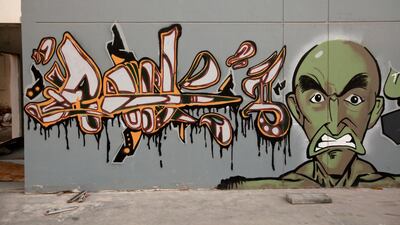I am happy to see the country opening up to graffiti art (eL Seed's towering new text in Ajman, July 5). I have been seeing an increasing number of graffiti art in the cities. My favourite is the one in Al Raha.
The value of art is in the eye of the beholder. We can agree, though, that much of the stuff that graffiti artists produce in other parts of the world hurt their cities. Some of it is beautiful, though.
Ibrahim M, Dubai
With no disrespect to el Seed and his art, I miss some real graffiti - the kind that appears overnight, sprayed by talented underground kids.
Wiltrud Matthes, Dubai
Drones ought to be regulated or even banned
Last year, Dubai International Airport closed its airspace three times due to drones flying too close to the area (UAE looks to combat drone incursions after Gatwick incident, July 5). Dozens of flights were diverted. These drones must be better regulated.
I have seen children flying drones in our neighbourhood. I am not opposed to that, but some of them fly them too close to the windows of high-rise buildings. Such activities are a nuisance. Who knows whether these drones are fitted with cameras or not? If drones cannot be better regulated, they should be banned. They can really pose security threats to individuals and institutions.
Maurice Taylor, Dubai
Traffic laws must be enforced across the country uniformly
Regarding the traffic law, I'm confused (More than 1,200 drivers caught by Dubai Police on first day of law change, July 4). The other day, I was driving on the highway at 65kph when the radar went off. I found it strange as I was in an 80kph zone, meaning one can drive at 100kph. This was in Ras Al Khaimah.
Christina Murphy, Dubai
I am glad that finally the new traffic laws are taking effect. This should happen all over the country.
More importantly, drivers need better training and the licensing system must be tougher. Why can’t the UAE follow a system similar to the ones in Canada or the United States?
Name withheld by request
Education cost is not that high compared to that of US
In reference to your article UAE parents pay more than double global average for education (July 3), if you paid $99,000 for private school from kindergarten to four years of college, you are getting a steal in UAE. In the United States, I have paid about $170,000 for my son to attend private school from the first to 10th grade, and I still have two more years of high school and four years of college to go.
Sharona Thomas-Wilson, Dubai
School fees are outrageous. There needs to be a serious reform in terms of how much schools should be allowed to charge.
Sara Smith , Dubai

